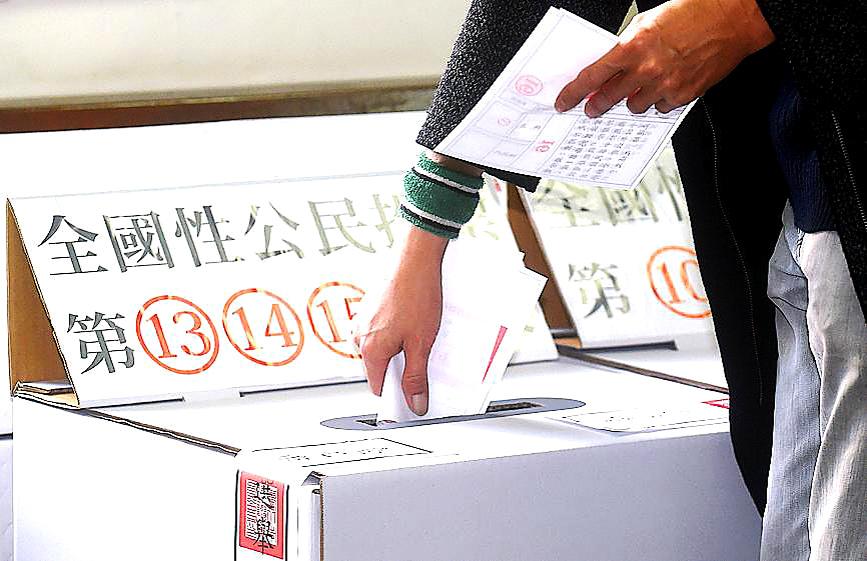A referendum on a proposed constitutional amendment to lower the voting age from 20 to 18 is to be held in conjunction with the local elections on Nov. 26, the Central Election Commission said on Friday.
To amend the Constitution, legislators must first pass a proposed amendment with at least three-fourths of all lawmakers present for the vote supporting the measure. Voters must then endorse it in a national referendum.
On March 25, the 113-seat Legislative Yuan voted 109-0 in favor of the revision. The referendum would require the support of at least half of all eligible voters to pass.

Photo: Liao Chen-huei, Taipei Times
The commission defended holding the referendum on the same day as the local elections, saying that as the proposed amendment reflects a high degree of consensus from the ruling and opposition parties in the Legislative Yuan, the choice of referendum date “should take into consideration the effect of civic participation in constitutional reform.”
It also said that the local elections would not detract from the constitutional amendment or confuse voters about its meaning.
Voters would receive a maximum of five election ballots and one referendum ballot, it added.
The commission also said that the day of the local elections would be a public holiday, making it more convenient for businesses to organize shifts for their workers so they can vote, while combining the two votes would prevent people from gathering twice amid the COVID-19 pandemic.
The commission had to defend its position because the Democratic Progressive Party (DPP) government has decoupled referendums from national elections.
The DPP successfully campaigned late last year to oppose a referendum that would have overturned an amendment to the Referendum Act (公民投票法) its lawmakers passed in June 2019 to separate referendums and elections.
Referendums on constitutional amendments are not subject to the act, and the threshold requiring the approval of 50 percent of eligible voters is double the approval required in normal referendums.
Civic groups cited the high threshold when supporting the plan to hold the referendum on the voting age on the same day as the local elections.
The Chinese Nationalist Party (KMT) on Friday said it respected the commission’s decision, but called on the DPP “to re-examine its use of double-standards.”
The KMT consistently called for referendums to be held concurrently with elections during the referendums last year, which the DPP opposes, KMT Chairman Eric Chu (朱立倫) said yesterday.
“If the DPP had any sense of shame, it would publicly announce that it is wrong and the KMT is right,” he said, adding that his party also firmly supports absentee ballot voting, which the DPP does not.
Additional reporting by Shih Hsiao-kuang

The Grand Hotel Taipei on Saturday confirmed that its information system had been illegally accessed and expressed its deepest apologies for the concern it has caused its customers, adding that the issue is being investigated by the Ministry of Justice Investigation Bureau. The hotel said that on Tuesday last week, it had discovered an external illegal intrusion into its information system. An initial digital forensic investigation confirmed that parts of the system had been accessed, it said, adding that the possibility that some customer data were stolen and leaked could not be ruled out. The actual scope and content of the affected data

‘LIKE-MINDED PARTNER’: Tako van Popta said it would be inappropriate to delay signing the deal with Taiwan because of China, adding he would promote the issue Canadian senators have stressed Taiwan’s importance for international trade and expressed enthusiasm for ensuring the Taiwan-Canada trade cooperation framework agreement is implemented this year. Representative to Canada Harry Tseng (曾厚仁) in an interview with the Central News Agency (CNA) said he was increasingly uneasy about Ottawa’s delays in signing the agreement, especially as Ottawa has warmed toward Beijing. There are “no negotiations left. Not only [is it] initialed, we have three versions of the text ready: English, French and Mandarin,” Tseng said. “That tells you how close we are to the final signature.” Tseng said that he hoped Canadian Prime Minister Mark Carney

POSITIVE DEVELOPMENT: Japan and the US are expected to hold in-depth discussions on Taiwan-related issues during the meeting next month, Japanese sources said The holding of a Japan-US leaders’ meeting ahead of US President Donald Trump’s visit to China is positive news for Taiwan, former Japan-Taiwan Exchange Association representative Hiroyasu Izumi said yesterday. After the Liberal Democratic Party’s landslide victory in Japan’s House of Representatives election, Japanese Prime Minister Sanae Takaichi is scheduled to visit the US next month, where she is to meet with Trump ahead of the US president’s planned visit to China from March 31 to April 2 for a meeting with Chinese President Xi Jinping (習近平). Japan and the US are expected to hold in-depth discussions on Taiwan-related issues during the

President William Lai (賴清德) yesterday bestowed one of Taiwan’s highest honors on Saint Vincent and the Grenadines (SVG) Ambassador Andrea Clare Bowman in recognition of her contributions to bilateral ties. “By conferring the Order of Brilliant Star with Grand Cordon on Ambassador Bowman today, I want to sincerely thank her, on behalf of the Taiwanese people, for her outstanding contribution to deepening diplomatic ties between Taiwan and SVG,” Lai said at a ceremony held at the Presidential Office in Taipei. He noted that Bowman became SVG’s first ambassador to Taiwan in 2019 and